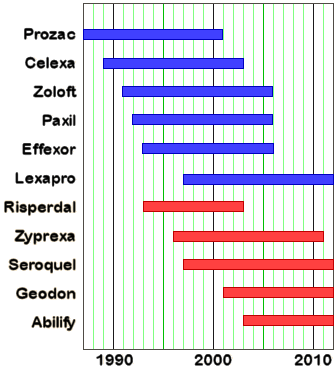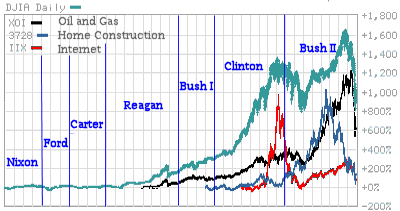I suppose my conclusion that "the pipeline really is empty" [psychopharmacological evangelism: but “the pipeline really is empty”…] might sound like a simple affirmation of the obvious, but that’s not how I see it. Dr. Insel‘s idea is that it’s empty because there are concrete obstacles [like government regulations, or costs, or pharmascolds, or who-knows-what] in the way of the inevitable march to the development of new, improved drugs for mental illness. Dr. Fibiger suggest that we don’t know enough right now to develop new drugs – our diagnostic system is inadequate and our knowledge of basic neuroscience too embryonal. He sensibly suggests that we put our efforts into these two areas instead of being obsessed with simply drug development. For completeness, let me add another possibility to the mix – that there aren’t any drug strategies or biological interventions as yet unrevealed out there to find for most patients – no matter what path we take. The latter is not so cynical as it sounds. While I fully believe that there are biological depressions, and even biological aspects to other depressions, I doubt that many of the people we see complaining of depression fall into either category. They rather have a panoply of life circumstances, present and past, and/or personality disturbances that are the major culprits. Some can be helped with symptomatic medication. Some are candidates for a variety of psychotherapies and psychosocial interventions. The solution for many is in solving the problems of wealth inequity and poverty – a worthy goal but hardly the venue for psychiatry. And some are simply the complainers among us, and that’s just that. Like all the rest of Medicine, the Chief Complaint is just where we start the exploration, not the where we start treatment planning. But whether you believe the logic of Dr. Fibiger or the musings of this aging balding old psychiatrist, the conclusion is the same – the pipeline is empty and we don’t have any idea where to go next to fill it. In fact, we don’t even know for sure that it can be filled at all, particularly in the way our psychopharmacological evangelists propose.
There are some alternative ways to look at the current situation. One I’ve often mentioned is Thomas Kuhn’s thinking about the life history of scientific paradigms [The Structure of Scientific Revolutions, 1962]. Kuhn’s idea [simplified] is that when a new way of scientific thinking comes on the scene [paradigm], there’s a flurry of great excitement. The new ideas are applied to old questions, and if they help, the enthusiasm mounts and spreads. It may even become a movement [paradigm shift leading to paradigm ascendency]. Then, there comes a later time when the inevitable exceptions begin to turn up, and as these foibles become increasingly apparent, the focus turns to the exceptions [paradigm decline leading to paradigm exhaustion]. It’s a time when we’re waiting for the arrival of a new paradigm to start the whole process over again. In some cases, a paradigm shift is vitually complete like the automobile replacing the horse-drawn carriage. In other situations, the paradigms both continue [paradigm competition]. For example. we all think Einstein was righter than Newton about gravity until we’re on a roof, then Newton is definitely in the forefront of our minds. Einstein is for egg-heads. In this frame, the psychopharmacologic paradigm is exhausted.
• dotcom bubble:
The Internet as we know it came into being with the introduction of the world wide web [html] in 1994. By 1998, Internet Companies sprung up everywhere and their market values took off like rockets – mostly traded on the new NASDAQ exchange. They boosted the whole Stock Market to record heights. When that bubble burst, many companies had no assets and evaporated. The belief that sustained the dotcom bubble was that the Internet was the wave of the future. While that was no myth, most of those dotcoms were hangers-on, doomed to failure from the start. Only a few survived [Google, EBay, Amazon, Adobe etc.] – companies with solid products or services.• housing bubble:
The massive inflation of home values began around the same time as the dotcom bubble, but took longer to peak. The delusion that it was a true rise in value developed more gradually, sustained by a prolonged period of "easy money" and encouragement by the government. While the story is much more complex, the net vector was the same – a falsely inflated asset that supported the entire market which then crashed and affected us all.• oil bubble:
While less well defined, the oil bubble was also widely felt. Gas prices rose precipitously [over $4/gallon]. We saw it as something else – the sign of dwindling reserves and began to plan for the unsure future by changing our driving habits, buying hybrids, going "green." All of those things were good ideas, but the prices were actually escalated by oil speculators who manipulated the markets. When it fell, the whole market joined it.
 A decent analogy is a "gold rush" when infectious enthusiasm drives a market to unrealistic heights. Shiller’s point is that financial bubbles invariably collapse – burst – a phenomenon we are all too familiar with these days. At the time of collapse, people do everything in their power to keep the dream alive, something we saw in spades in the collapse of the housing bubble. Ergo, we are in a period when the inflated psychopharmaceutical market has burst. I actually like this way of thinking, because it reframes the idea of a pipeline. The notion of a new-drug pipeline for CNS Drugs can be seen as fiction. It’s true that the drugs have continued to appear in waves over the last twenty five years, and the hype, fueled by the KOL set in psychiatry, has been that there was improvement in the process. Truth-be-told, the drugs themselves were clones of the originals from the 1950s – variations on a couple of themes – and the aura of constant improvement seems more myth than reality. There really has never been a pipeline in the first place. Reframing this history gives the "irrational exhuberence" a larger role and relegates constant improvement to the realm of illusion where it belongs. In this scenario, the psychopharmacological bubble has popped.
A decent analogy is a "gold rush" when infectious enthusiasm drives a market to unrealistic heights. Shiller’s point is that financial bubbles invariably collapse – burst – a phenomenon we are all too familiar with these days. At the time of collapse, people do everything in their power to keep the dream alive, something we saw in spades in the collapse of the housing bubble. Ergo, we are in a period when the inflated psychopharmaceutical market has burst. I actually like this way of thinking, because it reframes the idea of a pipeline. The notion of a new-drug pipeline for CNS Drugs can be seen as fiction. It’s true that the drugs have continued to appear in waves over the last twenty five years, and the hype, fueled by the KOL set in psychiatry, has been that there was improvement in the process. Truth-be-told, the drugs themselves were clones of the originals from the 1950s – variations on a couple of themes – and the aura of constant improvement seems more myth than reality. There really has never been a pipeline in the first place. Reframing this history gives the "irrational exhuberence" a larger role and relegates constant improvement to the realm of illusion where it belongs. In this scenario, the psychopharmacological bubble has popped.
Kant, Marx, and Hegel come to mind. Thesis, antithesis, and synthesis. In the last 120 years of psychiatry, the thesis or proposition was psychoanalysis; the antithesis was biological psychiatry, in response to the shortcomings and over reaching of psychoanalytic/psycho-dynamic models of the mind and psychopathology; and we now see the over reaching of the antithesis, which will hopefully generate a synthesis (a combined bio-psycho-dynamic propositional statement or theory), which, while representing an advance in our understanding of human suffering, will become the next thesis. And on and on, as science goes.
When a baseball pitcher performs badly, he is simply taken out of the game. All agree that there is a limit on the extent of liability one player is allowed to heap upon the team. Personal feelings take a back seat when the big picture; the goal of winning is the uniting force of a group— a team. Why is it that psychiatry as a professional group/team is unable to perceive the degree to which their *game* has been a huge liability for patients and tax payers alike….
Administering care to those who are ill and suffering seems closely related to a sense of caring. Doesn’t it? Well, then one might wonder what it is psychiatry sees itself doing as a speciality in the medical profession. IF there is no reflection, remorse and desire to rectify the damages of an erroneous paradigm of * harm*— why should psychiatry be called a “medical specialty”?
Claims to the throne? Divine right?—- both come to mind whenever I ponder articles about the next trail psychiatry hopes to blaze…. In the real world Insel and company belong on the bench— in a dug out far, far away from suffering people who are seeking professional help.
amazes me that there is a profession that views itself as having a claim to the throne
Not only is the “pipeline empty” in the area of new drugs, it’s empty in the area of new psychiatrists… Of the 50,000 psychiatrists in this country, half are nearing retirement age, and there are few recruits on the horizon,
The psychopharmacological revolution, the myth of reduced human suffering through the use of chenical agents has died… a sad day for the profession, but a good day for our society, as we replace a broken model, whose time has passed… one that caused more harm than good for the vast majority, with one that offers hope…
The recovey movement has taken root…
Duane
There’s no putting the toothpaste back in the tube.
Duane
Thought you might be interested in this one Mickey:
NIH defends grant money to notorious Nemeroff (can only imagine the high fives & butt slapping going on @ the University of Miami over this) http://bit.ly/OmXi4f
RE: the high fives and butt slapping visual— of Nemeroff and his colleagues at University of Miami after getting more $$$ from us taxpayers via NIH…
“A wise person, while dwelling in security, anticipates danger; a perverse person, while dwelling amid danger, takes security for granted.”–“The Problem to Be Pondered Night and Day”, Major Writings of Nichiren Daishonin. 13th century Buddhist leader/teacher, Japan.
The same *disconnect* leading psychiatrists have sustained FROM public opinion and scrutiny that has most likely served them well in their perpetual state of blind
ambition, will be their downfall. Rightly so, and a poignant example of poetic justice.